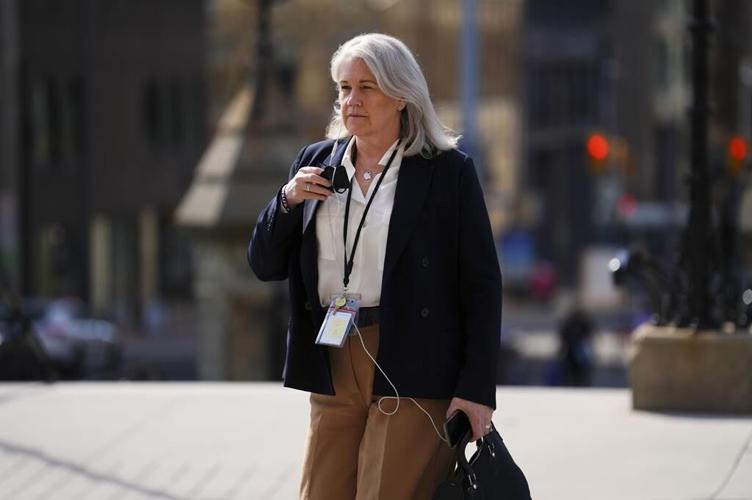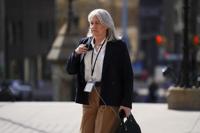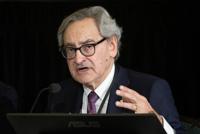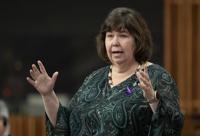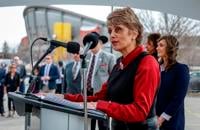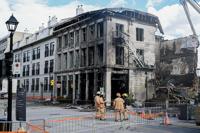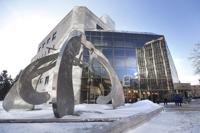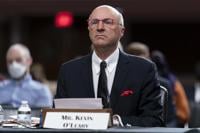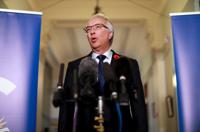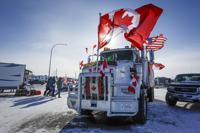OTTAWA - Canada's economy was already facing uncertainty when protests against COVID-19 restrictions blockaded border crossings and occupied downtown Ottawa last winter, the Department of Finance's top civil servant told an inquiry Thursday.
Michael Sabia, the deputy minister of finance, said the "Freedom Convoy" protests that began in late January came at a "very, very fragile moment" due to lingering effects from the COVID-19 pandemic and shifting dynamics in global trade.
He was one of three senior finance officials testifying at the Public Order Emergency Commission, an inquiry into the Liberal government's decision to trigger the federal Emergencies Act on Feb. 14 in response to the protests.
Sabia said the demonstrations, which shut down the flow of cross-border trade at major junctions in Alberta and Ontario, were hurting Canada's reputation as a reliable trading partner at a time when there was growing protectionist sentiment in the United States.
He also said finance officials feared there would be lasting consequences for the economy, particularly on the automotive industry, if protests went on for too long. At the time, Canada was negotiating with the U.S. on American tax credits for electric car manufacturing.
Finance briefings prepared during the protest and submitted into evidence at the inquiry say Canada's reputation as a reliable economic partner for the U.S. "may be in jeopardy."
Some U.S. lawmakers made public statements expressing concern about the impact of the protests, particularly on automotive assembly plants, and Global Affairs Canada officials testified earlier this week that there was significant anxiety among both American and ºÚÁϳԹÏÍø diplomats.
"Duration is everything here, in terms of the disruption on the ºÚÁϳԹÏÍø economy," Sabia testified, emphasizing that there would be "real human consequences" to the effects and that measures weren't taken simply for "antiseptic" or image-related reasons.
He added that it wasn't clear at the time the act was invoked whether the situation could worsen or spread. "There was no way of judging whether we could find ourselves in a situation of kind of rolling disruptions across various border points of entry," said Sabia.
It was also a "very delicate time" because the federal government was preparing its 2022 budget and eyeing the potential consequences of Russia's anticipated invasion of Ukraine, he said.
Department officials prepared a memo for Finance Minister Chrystia Freeland on Feb. 9 that detailed which legislative levers could be pulled to help end the protests, including a proposal to have bank accounts frozen.
The emergency powers ultimately allowed the government to regulate or prohibit "the use of property" to fund or support the blockade, which meant that financial service providers could immediately freeze personal or corporate accounts without facing any liabilities.
Sabia said the measure, announced along with other emergency powers on Feb. 14, was meant to deter people from coming to the protests and to encourage those already participating to leave.
"The minister of finance was very clear as of that date that people involved in these disruptions ran the risk of having their accounts frozen," he said. "It was very clear that all that had to happen was for those people to leave."
The emergency orders included a provision that banks, credit unions, crowdfunding platforms and other financial services providers register with FINTRAC and report suspicious transactions to the financial watchdog.
They also required institutions to review their relationships with anyone involved in the blockades and report their holdings to the RCMP or the ºÚÁϳԹÏÍø Security Intelligence Service.
About 280 accounts were frozen as a result, holding about $8 million in total assets. Sabia said the department's understanding is that none of the accounts belonged to people who had simply donated money to the convoy.
He said the number of people who held those accounts is significantly smaller. The officials were shown documentation that suggested 240 of the accounts belonged to only 57 people, and agreed that the ratio of four accounts to one individual would be accurate for the total number.
Reports by financial service providers provided to the commission suggest that 204 of the frozen accounts were savings or chequing accounts, and the remaining 76 were for credit cards or lines of credit.
The Department of Finance has not produced an assessment of the economic impacts of the blockades, but assistant deputy minister Rhys Mendes told the inquiry there was no direct, long-term impact on Canada's economy.
"It's fair to say the impact was limited," he said, adding that was only the case because protests weren't widespread or long-lasting.
Prime Minister Justin Trudeau's national security adviser, Jody Thomas, also appeared before the commission on Thursday.
This report by ºÚÁϳԹÏÍø was first published Nov. 17, 2022.

